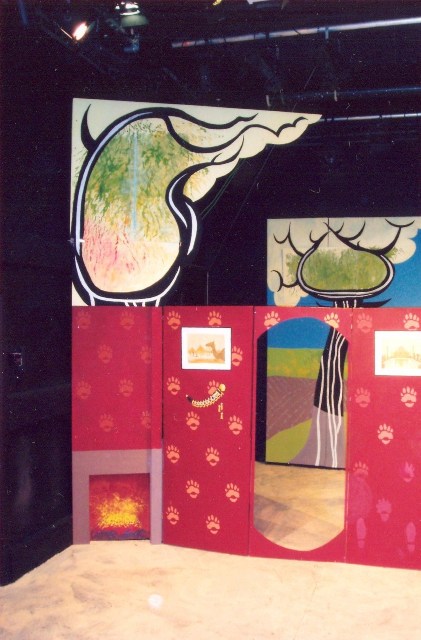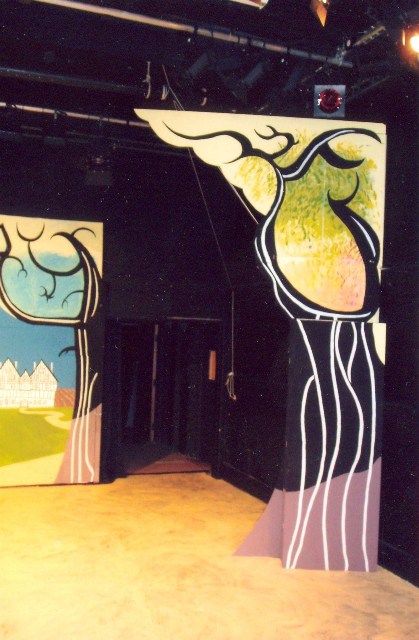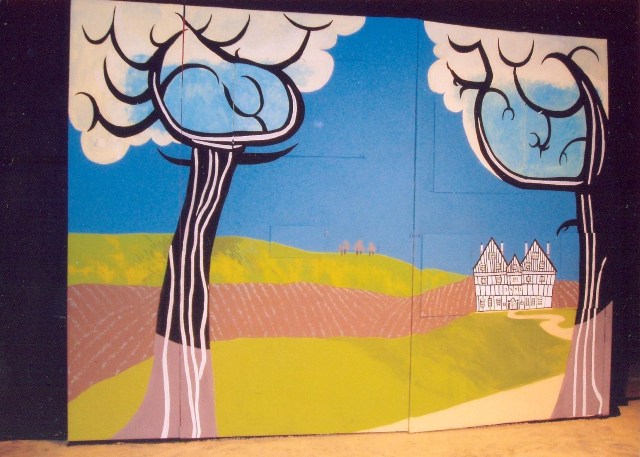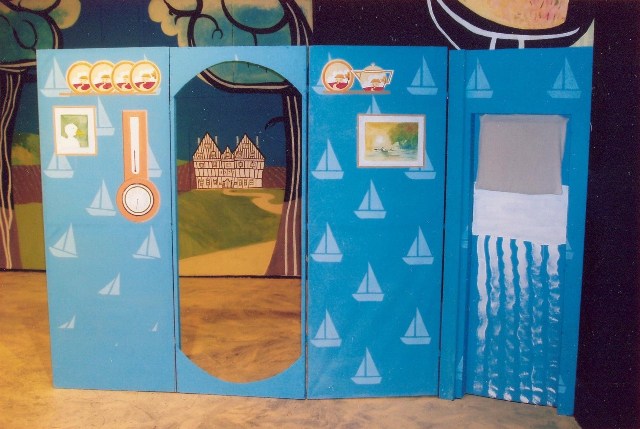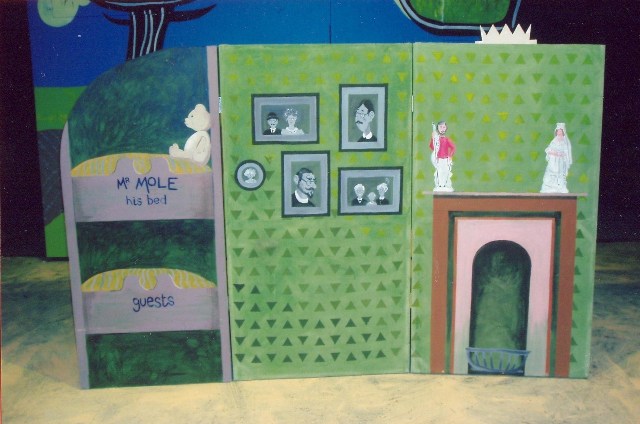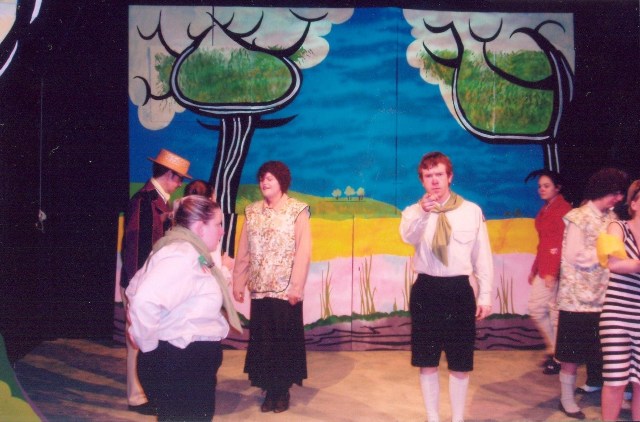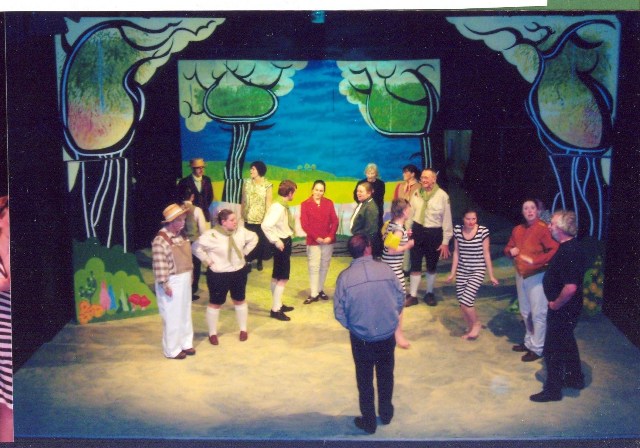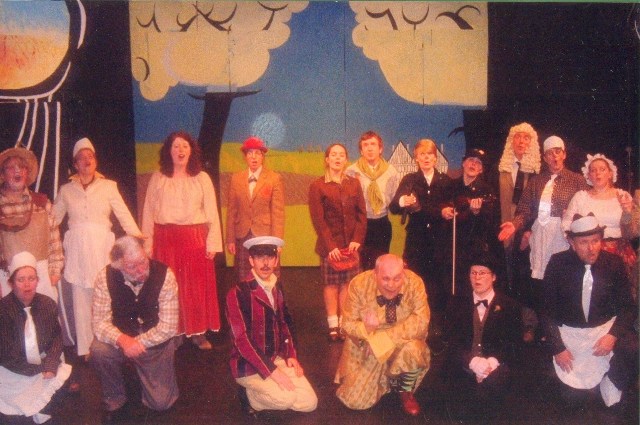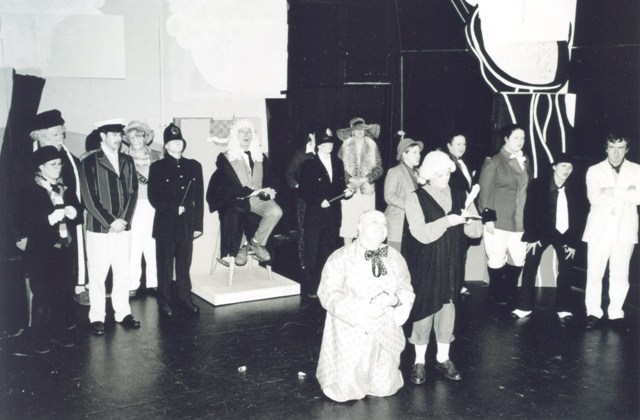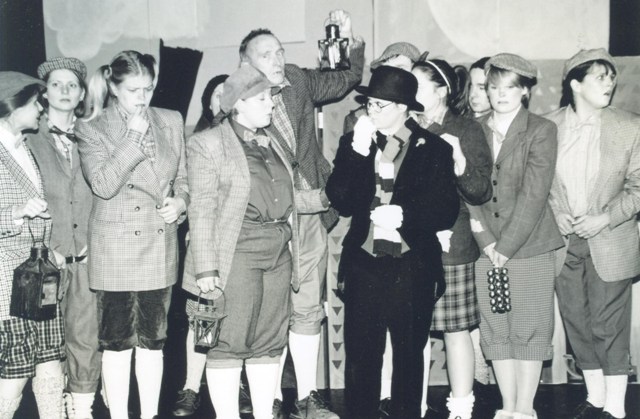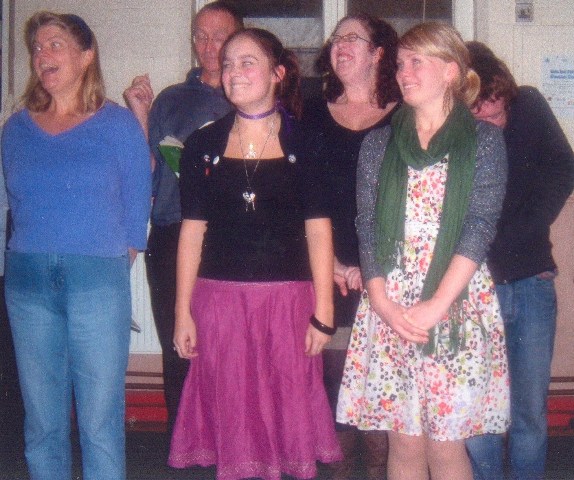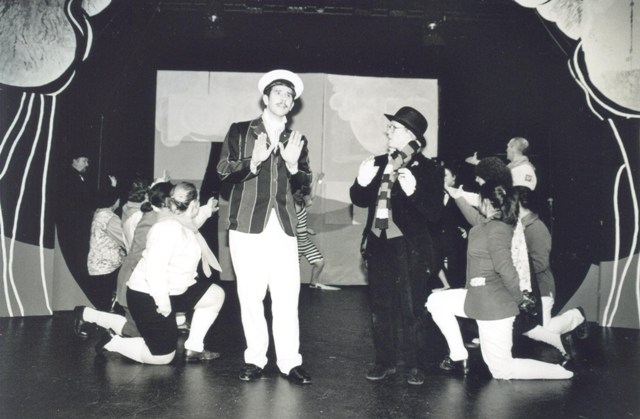The Bench Production
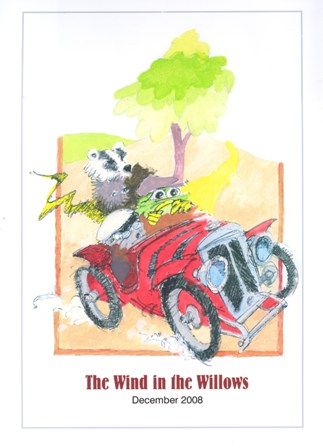
This play was staged at Havant Arts Centre, East Street Havant - Bench Theatre's home since 1977. The production was nominated for 'Best Amateur Drama' in The News 'Guide' Awards 2009.
Cast
| Mole | Kelly Edney |
| Ratty | Darryl Wakelin |
| Toad | Mark Wakeman |
| Badger | Peter Corrigan |
| Albert, the Horse | Ingrid Corrigan |
| Chief Weasel | David Penrose |
| Weasel Norman | Zoë Chapman |
| Squirrel Samuel, Ferret Gerald Motorist Rupert, Field Mouse | Charley Callaway |
| Hedgehog Harold, Hedgehog Billy Policeman, Field Mouse, Stoat | Melanie Cole |
| Squirrel Shirley, Fox, Field Mouse Barge-woman, Stoat | Alice Corrigan |
| Rabbit Rose, Ferret Fred Field Mouse, Gaoler's Daughter | Lorraine Galliers |
| Squirrel Raymond, Clerk Field Mouse, Ferret | Megan Green |
| Portly, Ian and Cyril Stoat Field Mouse, Policeman in Court Ticket Collector | Sian Green |
| Rabbit Robert, Stoat Stuart Field Mouse, Gypsy | Martin McBride |
| Granny Mouse, Washerwoman | Ruth Prior |
| Rabbit Ronald, Magistrate Field Mouse, Ferret | Terry Smyth |
| Hedgehog Herbert Hedgehog Tommy Motorist Monica Field Mouse, Ferret | Vicky Wakelin |
| Otter, Weasel Wilfred Car Salesman, Field Mouse Train Driver | Julie Wood |
| Singing Field Mice | Robin Hall Paul Millington |
Crew
| Director | Damon Wakelin |
| Producer | Jaspar Utley |
| Stage Manager | Jacquie Penrose |
| Assistant Stage Managers | Steffi Callaway Steph Chaplen Robin Hall Claire Lyne Sarah Turner Elizabeth Lewin-Diani Jeff Bone Paul Millington |
| Set Design | David Penrose |
| Set Realisation | Kevin West Simon Growcott David Penrose Pete Woodward Melanie Cole Julie Wood Jacquie Penrose Zoë Chapman |
| Lighting Design | Nathan Chapman |
| Lighting Operation | Jeff Bone Derek Callam |
| Musical Director | Ruth Prior |
| Musical Advisers | Simon Growcott Julie Wood Darryl Wakelin |
| Sound Design | Darryl Wakelin Julie Wood Ruth Prior |
| Choreography | Peter Corrigan Zoë Chapman |
| Costumes | Sue Dawes Bridget Tipper Marion Simmons Steffi Callaway Teresa Owen |
| Poster and Flier Design | Pete Woodward |
| Programme Editor | Derek Callam |
| Productions Secretaries | Paul Millington Jeff Bone |
| Front of House Manager | Gina Farmer |
Director's Notes
My last show with the Bench was 'Crave', an abstract tone poem for four actors. 'Wind in The Willows' is a whimsical re-imagining of a children's classic with a cast of twenty. Never let it be said I am one to shy away from a challenge...
As one would have hoped with a production such as this one, rehearsals have been enormously entertaining. Often my greatest challenge has been reining in over-enthusiastic woodland creatures! And Bennett's script has been a delight to work with; warm witty and whimsical. Just perfect for Kenneth Grahame's classic tales. (Although the homo-erotic undertones have been known to bring rehearsals to a grinding, giggling halt!) Bennett also, instinctively writes for the reader as well as the audience, and Willows is packed full of the funniest stage directions ever written. For example...
"Albert is a Wolverhampton cousin of Eeyore."
Or...
"Purists and driving instructors will have noticed that he has omitted to check his driving mirror and to give the signal for 'I am moving off'."
And my personal favourite...
"The Chief Weasel gives Toad a rabbit punch. I think this is all right; cf. The Englishman gave her a French kiss, or The cat dogged his every footstep."
Rehearsals for any show are unique and disparate. The content of rehearsals are defined by the script, the size of the cast, the style of the piece, the director's whims and fancies and the needs of the individual actors. I have tried to approach this show slightly differently.
In early rehearsals, emphasis was placed on large-scale warm-ups, technical acting exercises, off-text improvisations and team building and group sensitivity activities... all with an eye to working methods that would be redeployed in later rehearsals. Such work is not always popular, but is frequently productive, and so it has proved. The upshot of this early work is that technical and vocal exercises have fed well into the singing and chorus work; status games have informed great swathes of the action and the stage combat sessions have enabled the cast to choreograph their own roles within the Battle of Toad Hall.
For those of us who work or study in drama, it can be easy to forget that there are those in the company who have never trained or undertaken any sort of formal personal development around acting and its specific demands. Exposure to different methodologies can be invaluable. And for those of us who have been fortunate enough to engage with actor's training at some level, it is never to late to learn. And this includes me. I have happily given over warm-ups to other members of the company and stolen a number of exercises, I might add! and I hope that anyone who has worked with me will tell you, I am always open to external suggestions; I know quite a bit, but I certainly don't know everything!
Having decided early on that all sound for the show should be generated live and as an integral part of the action, I organised a workshop playing with sound effects. With the help of our able sound team of Darryl, Julie and Ruth, we gathered a large selection of instruments and random objects that could make a noise and we set to it. We split the workshop in to four working groups, gave them the run of the gathered objects and set them loose. Each group was given a season to represent. The brief was relatively simple; create a sound-scape that somehow represented their given season. Free rein was also given as to whether the interpretation for each group was literal or atmospheric.
The results were tremendous fun and enormously useful.
One of my favourite phrases is, "Art is theft", and we have stolen a number of ideas generated by that evening. We have also liberated ideas from recent productions by Soop, and Les Enfants Terribles; thanks chaps! And the ability of Darryl, Julie and Ruth to pull together these contrasting sources and add them to their own imaginative powers has been a joy to behold.
As ever with a show of this scale, I am indebted to the hard work, dedication and enthusiasm of so many people, many of whom also worked with me on 'His Dark Materials' two years ago. (They, like me, clearly live and don't learn!) So in no particular order; David for the extraordinary set, and Simon and Kevin for building it! Sue and the sewing circle for another fantastic array of costumes; Jacquie and her SM team, (SM gags have been exhaustive alongside the homo-eroticism); Ruth for MD'ing; Darryl and Julie for making noises; Peter and Zoë for choreography; Jaspar the über-producer and Vicky for having to live with it all for the past year.
We hope you enjoy watching the show as much as we have enjoyed making it.
Damon Wakelin
Reviews
remotegoatJill Lawrie
Great fun excellent family entertainment
Bench Theatre have produced an excellent portrayal of this classic tale, enjoyed on many levels and appealing to a broad age range from young children through to their grandparents.
It is the entertaining antics of the flamboyant Toad and his friends from the riverbank. Beginning when Mole forsakes the spring cleaning and is enticed onto the river by Ratty, where a whole new world opens up for the endearing Mole. Ratty, and his penchant for grammatical correction, introduces the little creature to the speed crazed Toad, Badger, and a whole host of animals, including an exciting camping trip in the caravan, ably drawn by Albert the horse. The storyline meanders through ventures into the Wild Wood, skirmishes with the weasels and stoats, Toad's imprisonment and ultimate escape by impersonating the washerwoman!
Director, Damon Wakelin, has excelled with this cast of 20 and a large and capable supporting network of backstage crew. Between them a wonderful array of vehicles were paraded including an excellent boat, doubling as a barge, horse drawn caravan, train and car, each bringing excited gasps from the younger members of the audience.
The set, reminiscent of Clarice Cliff's stunning stylised designs, was immensely imaginative and versatile efficiently and seamlessly transferring from the great outdoors to underground interiors and back again! A fabulous watery effect was projected onto the backdrop whilst members of the cast held a warm up routine as the audience assembled. Credit too for the many and varied costumes and sound effects provided by the company.
The four central characters Mole, Ratty, Badger and Toad were superb. Kelly Edney (Mole) was a joy to watch as the diminutive, naive and easily-enchanted little creature. Darryl Wakelin (Ratty) shone as the charming and engaging character. Peter Corrigan (Badger) brought this appealing animal to life but the ultimate accolade goes to Mark Wakeman (Toad) who gave such an exuberant lively and animated performance as the ostentatious flashy and garish Toad.
The performance was brought to an innovative barn dance finale and was much enjoyed by a large and enthusiastic audience.
remotegoat, 14th December 2008
The NewsMike Allen
Bench adapt the stage to superb effect
Bench Theatre rolls out most of its front-line troops for the Christmas show ending in the Battle of Toad Hall - and even those on the losing side in that sliced encounter cover themselves in glory.
Mark Wakeman plays Toad, the original attention-seeking petrol-head whose enthusiasms switch faster than his car goes. "I could have been an actor" the character exclaims at one point, and the performance is as full of bravura as it is of bravado.
Alan Bennett's adaptation of Kenneth Grahame's novel was created with a much bigger and more versatile stage area in mind, but Bench's directing design and stage management team of Damon Wakelin and David and Jacquie Penrose have overcome that in style. That leaves actors Peter Corrigan as Badger, Darryl Wakelin as Rat and Kelly Edney as Mole to work on the contrasts between them. I particularly like Wakelin's buttoned-up Edwardian bachelor.
The show is billed as suitable for all the family, but recommended for ages eight-plus. Continues from tomorrow until Saturday.
The News, 15th December 2008
